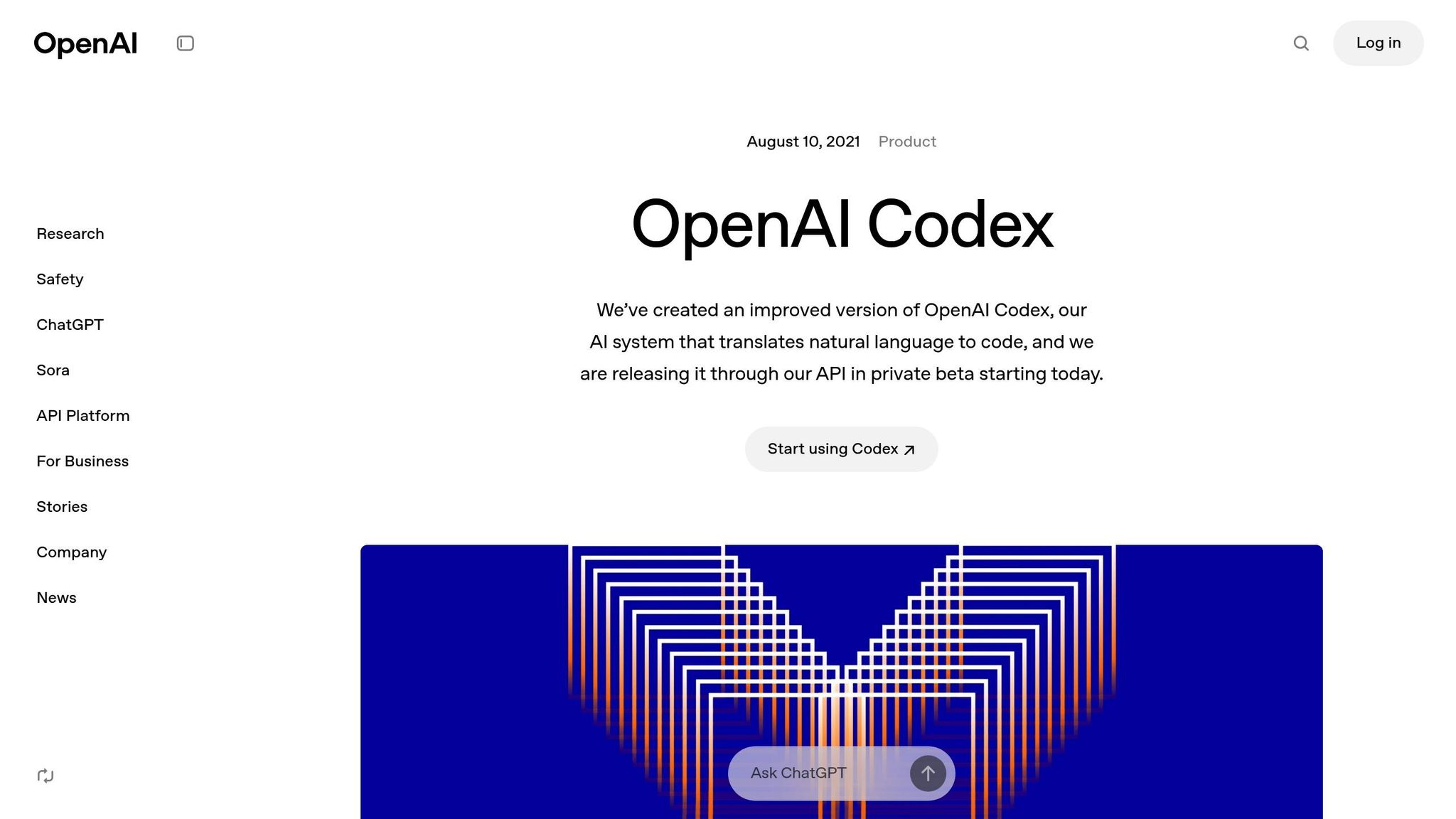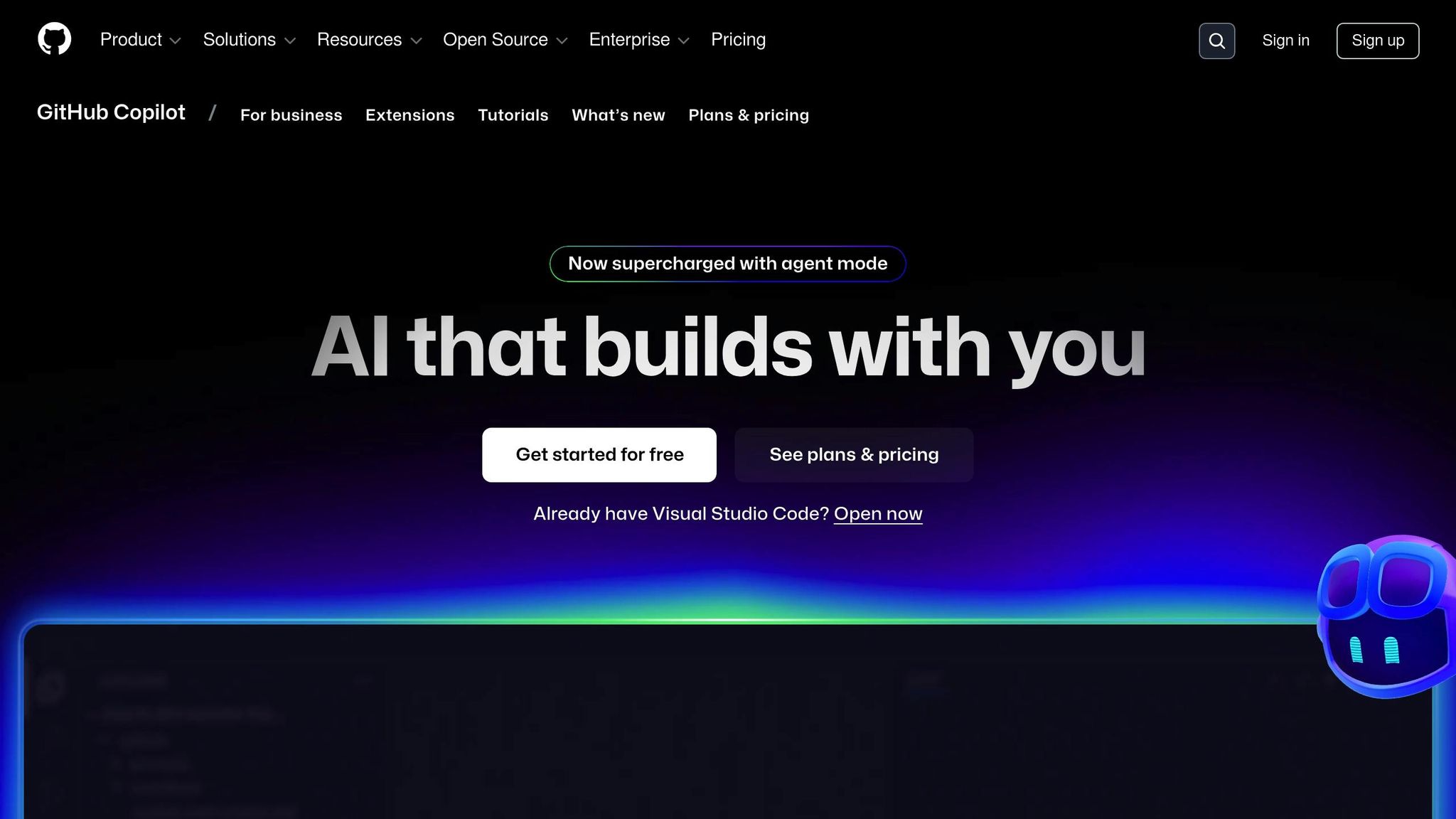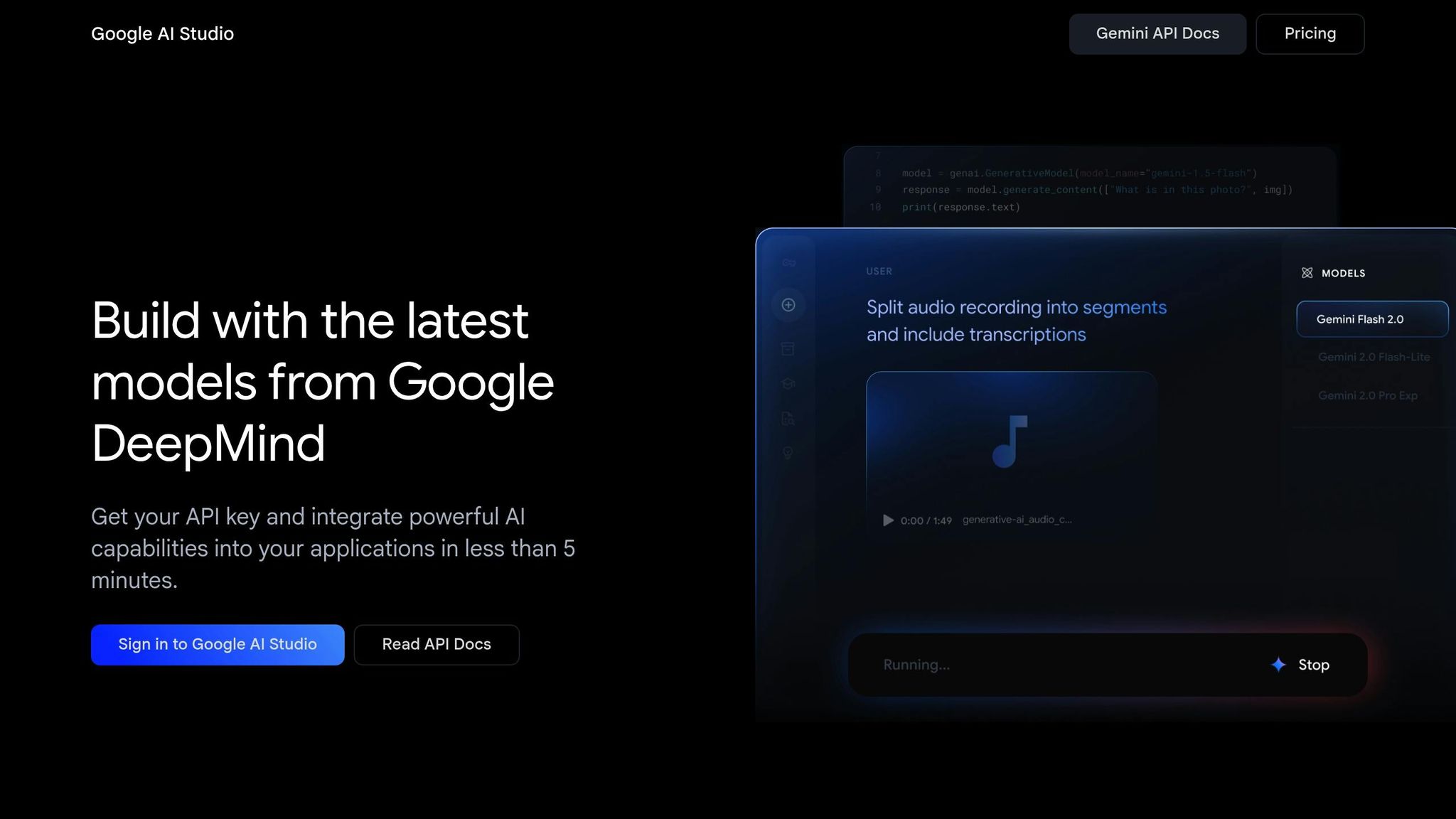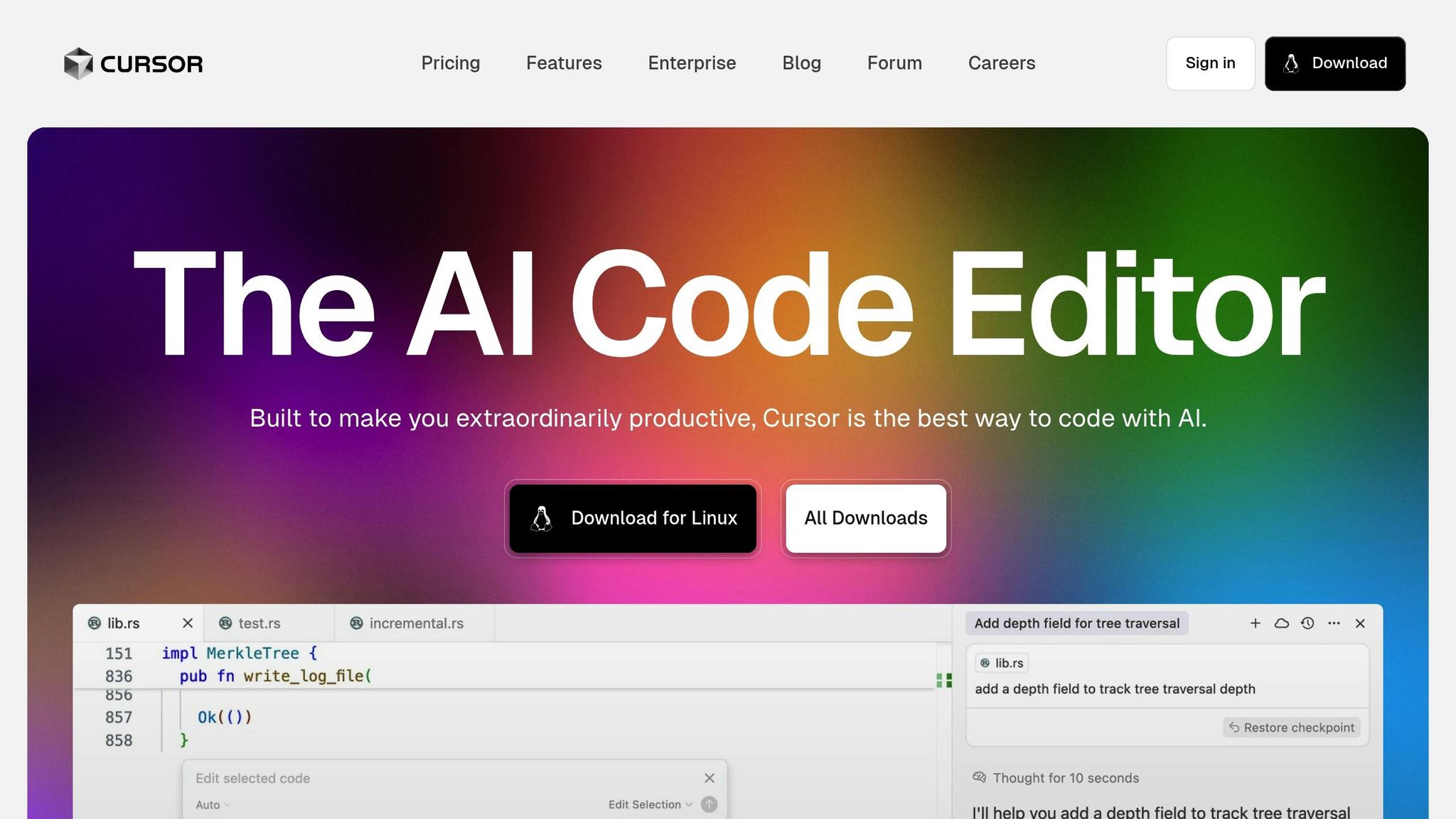AI tools have changed how we code in 2025, making it faster for coders, fixing errors, and letting them think up new stuff. Here’s a look at the five top tools:
- OpenAI Codex: Does full coding jobs by itself for half an hour. Best with Python and fits well with old ways of working. Cost is $20 each month through ChatGPT Plus or API fees.
- GitHub Copilot: Gives smart code tips, works with well-known IDEs, and makes coding 55% quicker. Starts at $10 a month for Pro or $19 a month for groups.
- Gemini AI Studio: Great at big projects with many types of uses. Has a free plan, higher plans start at $22 a month.
- Claude Desktop: Runs without a net, keeps things secure, and digs deep into code. Pro plan is $18 a month.
- Cursor: Set up on Visual Studio Code, lets you change many files and find bugs. Pro plan costs $20 a month.
Quick Look at Them
| Tool | Monthly Cost | Key Features | Best For |
|---|---|---|---|
| OpenAI Codex | $20 (Plus) | Codes on its own, knows Python well | Hard work setups |
| GitHub Copilot | $10 (Pro) | Clever code help, works with IDE | Day-to-day code work |
| Gemini AI Studio | $22 (Advanced) | Can do many things at once | Big, hard work |
| Claude Desktop | $18 (Pro) | Can work offline, safe code work | Work that need to be safe |
| Cursor | $20 (Pro) | Works with VS Code, can find code bugs | Coders using VS Code |
These tools help many, from one coder to big groups. Try no-cost types if you can, to see what works best for your work style.
The Best AI Coding Tools to Use in 2025 | Colin Matthews
1. OpenAI Codex

OpenAI Codex is a web AI tool made to deal with all parts of coding, from making new parts to fixing errors and sorting out pull requests. Unlike usual code help tools, Codex works by itself for up to 30 minutes, handling full code tasks without constant help from people.
What It Does
Codex runs on codex-1, a special form of OpenAI's o3 model set just for coding jobs. It hits a 75% right score on code tests, doing better than the top o3 model by 5%. This tool does not just write code - it can test, find errors, and commit it too.
In a secure web sandbox, Codex works with your code storage. It can look at and change files, do tests, use linters, and run type checks. A big plus is how it can copy the way humans write code and match how your team handles pull requests. Codex also shows terminal logs and test results, making what it does clear and easy to check.
To fit your own project, Codex uses AGENTS.md files in your code storage. These files help the tool know how to move through your code, do tests, and stick to your team's coding rules. Rather than making you change how you work, Codex fits smoothly into your current ways, making it a good tool for many coding setups.
Languages and Setups
Codex works with many coding languages, like Go, JavaScript, Perl, PHP, Ruby, Shell, Swift, and TypeScript. It works great with all these, but it's very good with Python. As Codex runs all on the web, it fits right in with any coding setup - no need for extra IDE stuff.
Using It
Using Codex is simple. Through the ChatGPT screen, you type what you need, hit the "Code" button, and let it do the work. Tasks can take from 1 to 30 minutes based on how tough they are. Codex can also do many jobs at once, making things flow better.
By May 2025, firms like Emelia.io, Temporal, and Superhuman said that Codex had made boring tasks shorter, sped up making new parts, and made tests better.
"Adopt an 'abundance mindset' running multiple tasks in parallel and treating the agent as an independent teammate tend to be the most successful, sometimes generating 10+ PRs a day." – OpenAI's team
To get great results, users should split work into clear tasks and give full guides. Treat Codex like a part of your team - give it set jobs while you handle the big plan - and it will really up your work speed. This way makes sure that being fast does not hurt safety or quality.
Costs and Easy Use
Codex is built to be safe, running with no need for the web during use and trained to say no to bad asks. You can get it through ChatGPT Plus for $20 a month or use API for $1.50 per million input words and $6 per million output words, with a 75% cut for saved prompts. This cost plan makes Codex a cheap choice for both solo coders and teams aiming to do more without spending too much.
2. GitHub Copilot

GitHub Copilot is like your own code helper at your side. It gives you full code lines based on your project's needs, aiding coders to get stuff done quicker. By looking at your work, it makes everything from tiny bits to whole classes just right for you. Let's look deeper at what it brings and how it changes the software making world.
Traits and Skills
A key part of GitHub Copilot is its agent mode. This mode works on its own, taking on GitHub tasks by setting up a safe spot through GitHub Actions. Here’s what it does: it starts a virtual spot, copies your work place, sets things up, and goes deep into your code with smart tech.
It's good at checking code too, not just for easy mistakes. It finds hidden errors and tips on how to make things better. It can auto-make detailed notes with ///, which helps keep your code easy to read. Copilot also shows next edits, helping you see how tweaks might change your work, great for keeping things smooth in your files.
It's also on top of things like redoing code, making tests better, fixing errors, and adding new stuff. It even makes upgrading simpler by making and doing detailed plans, with wrap-ups of what was changed.
Backed Languages and Places
GitHub Copilot can use any code language from public spots, fitting a wide range of tech setups. It works well with known coding spots like Visual Studio Code, Visual Studio, JetBrains IDEs, and Neovim. Use it too as an add-on for Vim, Azure Data Studio, and the GitHub CLI. For big users, it's built into GitHub.com and works on GitHub Mobile. Want more? It even chats in Windows Terminal Canary.
Joining and Flow
Copilot slips right into your flow by making draft pull requests and adding need-to-know details. It also keeps clear session logs so you can watch progress live, making it simple to keep track of things.
Real-world Effect
The facts show it all. Coders with GitHub Copilot finish tasks 55% quicker and have a 78% win rate on coding jobs, better than 70% for those without it. Pull requests blend 50% quicker too, which really ups team work.
"The GitHub Copilot coding agent fits into our existing workflow and converts specifications to production code in minutes. This increases our velocity and enables our team to channel their energy toward higher-level creative work."
- Alex Devkar, Senior Vice President, Engineering and Analytics, Carvana
"The GitHub Copilot coding agent is opening up doors for human developers to have their own agent-driven team, all working in parallel to amplify their work. We're now able to assign tasks that would typically detract from deeper, more complex work - allowing developers to focus on high-value coding tasks."
- James Zabinski, DevEx Lead at EY
Cost and Easy Use
GitHub Copilot has plans for one person or groups:
-
Plans for One Person
- GitHub Copilot Free: Free, comes with 2,000 fills and 50 chat asks a month.
- GitHub Copilot Pro: $10 a month or $100 a year, gives you all the fills and chats with GPT-4.1, and 300 more asks a month.
- GitHub Copilot Pro+: $39 a month or $390 a year, adds new models like Claude Opus 4 and GPT-4.5, with 1,500 asks a month.
-
Plans for Groups
- GitHub Copilot Business: $19 for each person every month.
- GitHub Copilot Enterprise: $39 for each person every month, gives big work features.
Students, teachers, and ones who look after open-source projects may get Copilot Pro for free. If you go past your plan's asks, more are $0.04 each, and the count sets at the start of each month.
With its help in work joy and doing more - users say they are up to 75% happier in jobs and work 55% faster - GitHub Copilot is a big help for coders everywhere.
3. Gemini AI Studio

Gemini AI Studio brings Gemini models right to your code space. It's made to read code, images, sound, and video. It has a huge 2-million-token view, great for big codes and hard tasks.
What it Can Do
Gemini AI Studio works with many types at once, making it fit for all sorts of code work. For example, you can:
- Make web app looks from a plain pic
- Make fun learning apps with video use
Now at top spot on the WebDev Arena list with a big ELO of 1,415, the Gemini 2.5 Pro model is great at making web app looks, adding new IDE things, and making smooth UI moves.
What makes Gemini 2.5 stand out is how it thinks. It looks at issues well before giving answers, which means better and more smart code tips. You can also change how it runs to mix speed and cost. With a score of 84.0% on the MMMU test and leading on LiveCodeBench, Gemini 2.5 Pro Deep Think shows its strong mixed thinking skills.
"The updated Gemini 2.5 Pro achieves leading performance on our junior-dev evals. It was the first-ever model that solved one of our evals involving a larger refactor of a request routing backend. It felt like a more senior developer because it was able to make correct judgment calls and choose good abstractions."
- Silas Alberti, Founding Team, Cognition
Main Languages and Tools
Gemini Code Assist works with all code types you often find online. This helps it fit any tech stack. It also works well with known tools like Visual Studio Code and JetBrains IDEs.
The AI can deal with over 40 code types, and newer ones like Gemini 2.0 Flash handle more than 100 languages. It also works well with Model Context Protocol (MCP) using Google Gen AI SDK, making it easy to use open tools. This wide support makes coding smooth and quick.
How It Fits In The Work
Gemini AI Studio makes coding easier. By joining with the Gen AI SDK, it lets you make full apps from text, pics, or videos without changing tools. The way it works feels easy - you can chat to tweak web apps, check changes or undo them, all in one place. When you need to start using your work, a simple click sends it to Cloud Run.
In June 2025, Citizen Health used Gemini 2.5 Pro for health records. By sending data right into big memory areas, they cut wait times and made better choices, showing how well Gemini AI Studio works in up-to-date coding jobs.
"We found Gemini 2.5 Pro to be the best frontier model when it comes to 'capability over latency' ratio. I look forward to rolling it out on Replit Agent whenever a latency-sensitive task needs to be accomplished with a high degree of reliability."
- Michele Catasta, President, Replit
Cost and Ease of Use
Gemini Code Assist gives away a great 180,000 monthly finishes for no cost - way more than other free coding helpers, which only allow about 2,000 finishes each month. To get started, just use your own Gmail.
With over 75% of programmers now using AI tools every day, Gemini AI Studio shines as a strong, all-around tool for today's coding needs.
sbb-itb-212c9ea
4. Claude Desktop
Claude Desktop takes Anthropic's strong AI setups out of the web and puts them right into your own work area. Unlike other web-based coding tools that work online, this one works fully in your terminal. It fits right into how you already work, no need for extra servers or web windows. This home-first setup helps keep coding smooth, as shown in the features down below.
Features and Powers
At the core of Claude Desktop is the Claude Opus 4 model, known as "our best and top coding model yet". It hits top marks of 72.5% on SWE-bench and 43.2% on Terminal-bench. This tool can take on big project tasks, perfect for working on many files. It makes code easy to read, changes scripts into simpler parts, and explains errors well. It also makes Git tasks easier with simple speak commands. Claude Desktop can run tests, fix what's not working, and set code rules to keep good quality in check. Its Artifacts feature gives developers real-time see-through updates.
"Claude Code has dramatically accelerated our team's coding efficiency. I can now write EDA code in a notebook - pulling data, training a model, and evaluating it with basic metrics - and then ask Claude to convert that into a Metaflow pipeline. This process saves 1-2 days of routine (and often boring!) work per model."
- Anton Biryukov, Staff Software Engineer at Ramp
Easy-to-Use Language and Tools
Claude Desktop teams up with known IDEs like VS Code and JetBrains, letting you change text right in your files. It backs top tools such as Opus 4, Sonnet 4, and Haiku 3.5 with its Claude Code SDK. This SDK works with TypeScript, Python, and basic tools for things like auto code checks, fixing code, and changes. The tool also links to TypeScript hubs, linters, and check tools, giving tips that need small fixes. Set up is easy: just get NodeJS 18+ and run npm install -g claude-code [46, 45].
Easy Work Steps
Claude Desktop makes hard Git work simple and mixes well via the Model Context Protocol (MCP). People at Anthropic use it for most of their Git work, more than 90%. MCP lets Claude hook up with many tools and data spots. By June 2025, Anthropic brought in links with services like Jira, Confluence, Zapier, GitHub, and Linear. This lets Claude get a deeper look at projects.
"When you connect your tools to Claude, it gains deep context about your work - understanding project histories, task statuses, and organizational knowledge - and can take actions across every surface. Claude becomes a more informed collaborator, helping you execute complex projects in one place with expert assistance at every step."
- Anthropic
Claude Desktop helps with tasks in the background via GitHub Actions and has a headless mode for when you can't interact with it. This is good for CI pipelines, hooks before commits, and scripts for building. Developers can set up how they work by using CLAUDE.md files to write down common bash commands, main files, and test steps [45, 52]. These tools make work faster and better.
Cost and Ease of Use
You can get to Claude Desktop through Anthropic's API price plans, getting straight to its models with no need for other providers. This makes sure it works well and is always up. Big firms have seen its worth. For instance, Rakuten used it for a 7-hour open-source redo with Claude Opus 4. Block called it "the first model to help with code quality as you write and fix" and said it's very reliable.
"Claude Code marks a threshold moment for AI in software development. At Intercom, it enables us to build applications we wouldn't have had bandwidth for - from AI labeling tools to ROI calculators for our Sales team. Its ability to handle complex, multi-step tasks sets it apart from alternatives."
- Fergal Reid, VP of AI at Intercom
5. Cursor

Cursor is a smart code tool built on Visual Studio Code, made to change how coders write and work with code. Unlike old tools that just add AI as an extra, Cursor mixes AI into the whole code work. It uses the clean look of VS Code and adds new parts that do much more than simple code finish, making it top for coders.
Parts and Uses
Cursor has many smart tools, beginning with its guess finish, which knows your next step. It also brings in Composer Mode for chat-like code making and Agent Mode for changes in the whole project. Here is more on its main parts:
- Composer Mode: You can make code by talking.
- Agent Mode: Lets you change many files in your project at once.
- Multi-tabbing: Lets you look, say yes, or say no to changes one by one.
- Context Management: Uses a
.cursorrulesfile to set the code style and work flow you like. - Debugging Help: Has a "Debug with AI" option right in the terminal for better fixing.
"The Cursor tab completion while coding accurately anticipates code edits around 25% of the time. It is enough to make you believe that eventually you'll be able to code at the speed of thought." - Kevin Whinnery, OpenAI
The Cursor tool keeps getting better. By April 2025, it added OpenAI's o3 and the free o4-mini models, putting top AI into the system. At that time, it also let all users use GPT-4.1 for free for a while. Before, in March 2025, it brought in new things like auto-fix for mistakes, a better menu bar, and code looks.
Easy to Use With Many Codes
Cursor works with lots of code types and places. You can move your liked add-ons, looks, and key setups from your old VS Code, making it easy to switch.
It's also great with AI, working with groups like OpenAI, Claude, Gemini, Grok, and DeepSeek. By April 2025, Claude 3.7 Sonnet was the top choice for users, with Gemini 2.5 Pro next. More than coding, Cursor lets you add smart tags (using @), put in pictures for code work, and get live info from the net using @Web. The @LibraryName helps you find and use big libraries fast.
Better Way to Work
Cursor makes your daily code work flow smooth with smart tools. It can write and run terminal commands, find lint mistakes, and sort out hard debug jobs. For example, hit Ctrl K to change text or run terminal commands in simple English, so you don't have to keep switching your focus.
The tool also knows what your project needs, offering fitting tips and quick answers for your code. These perks keep you on track and cut down on stops, making code work flow better.
"Cursor is at least a 2x improvement over Copilot. It's amazing having an AI pair programmer, and is an incredible accelerator for me and my team." - Ben Bernard, Instacart
Cost and How to Get It
Cursor has a free version, letting coders use a few quick model asks - great for trying out what it can do. If more strong AI help is needed, the Pro plan is $20 each month. This offers more top-level AI uses and extra special tools. The way it's priced makes Cursor easy to use and strong for both single coders and groups.
Tool Check: Good and Bad
Every tool we looked at before has good and bad sides, fitting well with different ways devs work and what they like.
OpenAI Codex is good as it works with more than 12 coding ways, like Python, JavaScript, and C++. It works great with GitHub, which helps a lot for stuff on there. Codex runs in a safe cloud spot, which cuts web reach while making code. Devs can lead it by AGENTS.md files in work spots, letting it stick to certain work rules.
GitHub Copilot is liked for being easy to use and giving good code tips. It fits right into well-known IDEs, has a free part with 12,000 fills each month, and is no cost for students and folks who make open-source stuff. Yet, some big groups worry about code going outside their own space.
Gemini AI Studio works with Node.js, Python, and a few more. It runs on Google Cloud and lets the web in, which lets devs look up info fast - a key point for those who need info quick. Its bigger plan starts at $22 a month, with more stuff for those who need more.
Claude Desktop aims at safety, good design, and deep code checks. It has a free part with basic chat, while its Pro plan is $18 a month, and Team access is $25 a month. It does well at checking and explaining code, but it misses some special IDE fits that others have.
Cursor fits smoothly with VS Code, offering things like agent mode for big goal doing. The Pro plan costs $20 a month and has no end to fills. It lets users bring in their own VS Code looks and moves, making it easy to switch. Cursor also works with many AI helpers, giving it a lot of ways for different dev needs.
Here's how they stand next to each other:
| Tool | Monthly Cost | Key Strengths | Main Weaknesses |
|---|---|---|---|
| OpenAI Codex | Changes | Knows 12+ languages, works with GitHub, safe use space | No web use, hard to set up |
| GitHub Copilot | $10 (Pro) | Easy to set up, works in IDE, free for those in school | Worries about big group safety |
| Gemini AI Studio | $22 (Advanced) | Can look up things online, has a free level | Not many languages used |
| Claude Desktop | $18 (Pro) | Cares about right use, thinks well, safety first | Not many IDE tools |
| Cursor | $20 (Pro) | Agent mode, works with VS Code, can do many AI tasks | Hard to learn for big things |
Costs and What You Get
GitHub Copilot's best Pro deal is $10 a month. Cursor also does well at $20 a month for all-you-can-use service. For teams, it costs more - GitHub Copilot for teams is $19 for each person each month, and Cursor goes for $40 per person.
Ease of Use and Options
GitHub Copilot is great for easy use in your coding space. Cursor lets you use many AI tools and lets you set up your coding space your way, so it fits many needs. OpenAI Codex works well with GitHub but needs more tech know-how. Claude Desktop is good at reading code but falls short on some coding features.
Help for Many Languages
If you code in many languages, OpenAI Codex and GitHub Copilot are best as they cover more. Gemini AI Studio is best for just five main languages and fits more narrow needs.
Picking What Works for You
Different tools are best for different jobs. GitHub Copilot is top for everyday coding, while tools that are open to all might be safer for top-secret projects. Trying free versions is a smart way to see if a tool works for you before you pay.
End Thoughts
Picking the right AI tool rests on what you need and how you work. Let's break it down by user type:
For Solo Developers and Freelancers
As a solo dev or freelancer, GitHub Copilot ($10/month) is top-notch. It can up your coding speed by up to 55%, blend well with your IDE, and even make your job more fun. On the other side, Cursor ($20/month) gives unlimited completions and strong tools for change, great for those on VS Code.
For Team Developers
For groups, both GitHub Copilot ($19 per person/month) and Cursor ($20 per person/month) are good for team work and keeping code clean without messing up your current flow.
For Big Companies
Big companies can see work go up 40–65% and push out features 3–5x faster with tools like OpenAI Codex and GitHub Copilot. These tools are safe and help with many coding languages.
Making Your Pick
As we saw, the right AI tool can quicken coding, boost team work, and keep code solid. If you want something easy and smooth, GitHub Copilot is a good go-to. But, if you need more complex tools and are okay with a hard start, Cursor could be good.
Try them for free to see which fits your work best.
AI coding tools are growing fast, and these options are at the front, helping devs code quicker and smarter. Find the one that fits your wants, cash, and group size, and you're set to see better work and code quality.



